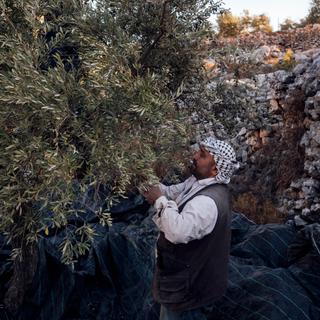


In the West Bank, a bitter olive harvest, with settlers looming
FeatureEast of Ramallah, the village of Burqa lives in fear of being attacked by Jewish extremists whose illegal settlements are expanding. Now that the harvest season has begun, incidents are increasingly frequent throughout the occupied territory.
Barakat Youssif Sidon warned us to leave. "They're coming." A strange vehicle, a buggy, had just appeared on the road driving down the hill overlooking Burqa, a Palestinian village in the heart of the occupied West Bank. Its inhabitants feared another attack by Israeli settlers, whose white mobile homes stand out against the hillside. In the end, nothing happened on Friday, October 25, but the alert highlighted the extreme tension prevailing in this village a few kilometers east of Ramallah, as the traditional olive harvest, essential for the income of local households, is in full swing.


Israeli settlers and Palestinians have each retreated to either side of an informal yet very real border. Beyond the last house to the east of the village, the road is blocked by large stones and no one dares to cross this boundary. It is from this area that the buggy driven by a settler came from.
Recently in Burqa, settlers armed with sticks tried to launch an expedition before being stopped at the last moment by the army. "We're surrounded by settlers. They come, steal and ransack everything to force us to leave," said Youssif Sidon. The septuagenarian said he has already lost several plots of olive groves over the years but that since the October 7, 2023 massacre committed by Hamas commandos on Hebrew territory and the start of the war in Gaza, the situation has only worsened. "In one year, we've documented 20 attacks," concurred his son, standing on the threshold of the mosque where the small group had gathered.
Illegal settler outposts
"Before the war, settlers had burnt olive trees near my home," said another resident, Ashraf Moussa Nawabit. "I went to see the [Israeli] soldiers who are supposed to protect us, but they told me it was none of their business. We also called the fire department, but the army wouldn't let them come here." Scorched trees are visible on one edge of the hill. The three settlements surrounding Burqa, like Kokhav Ya'akov to the south, are not new, but illegal outposts – settlements that are illegal even under Israeli law – are expanding and increasing the pressure on the local population.


The olive harvest, which had already been difficult in 2023 and officially began this year on October 15 across the territory in accordance with the Palestinian Authority's instructions, is once again looking bleak. "The situation is complicated by the lack of rain but mostly because settlers are increasingly violent. Some of them are armed, they come and tell us to leave, leaving everything behind, even though this is our grandparents' land!" railed Iyad Abu Gharqoud, 30. A native of Gaza who has lived in Burqa for over 15 years, the professional footballer, who played for the Palestinian national team before the war, built a paltry wooden fence around a small plot of olive trees. With the help of his family, he hand-picks the fruit from a centenarian tree.
You have 58.84% of this article left to read. The rest is for subscribers only.
